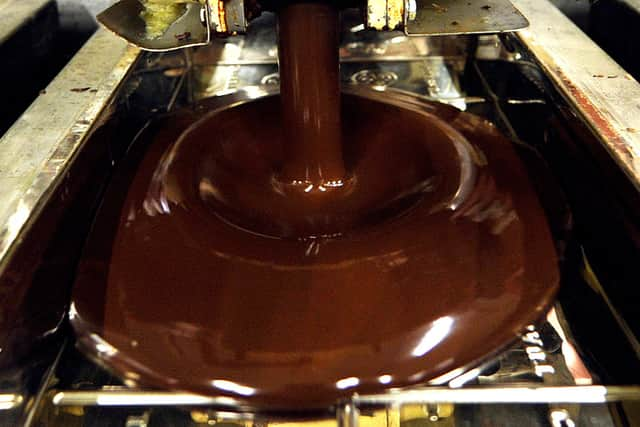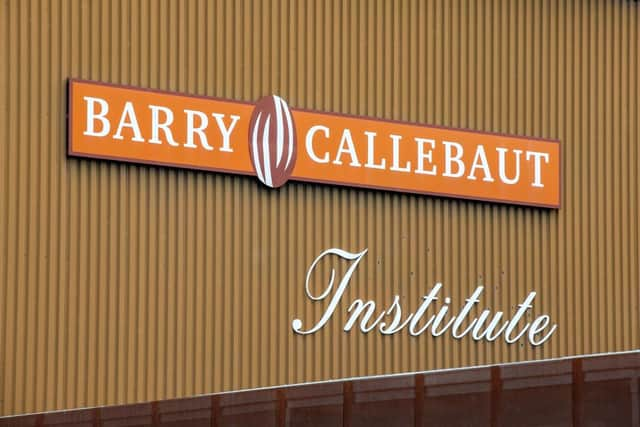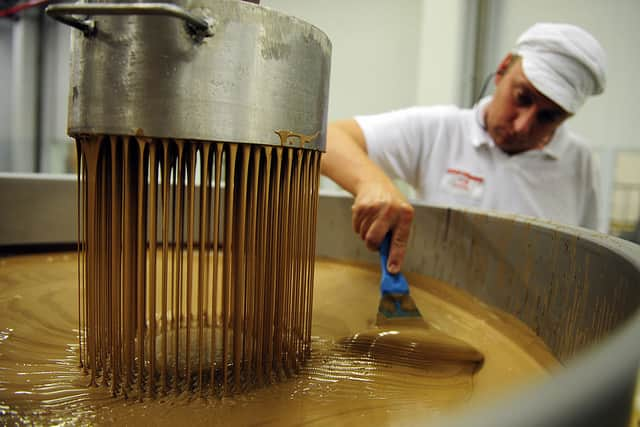Salmonella outbreak at chocolate factory: plant that supplies Hershey, Nestle and Unilever stops production
and live on Freeview channel 276
A Salmonella outbreak has once again threatened supplies of some UK foods after being detected at the world’s largest chocolate factory.
Production halted at the Barry Callebaut factory in Wieze, Belgium on Monday (27 June), after the food poisoning bacteria was discovered.
Advertisement
Hide AdAdvertisement
Hide AdIt comes after Salmonella forced chocolate brand Kinder to issue a major product recall earlier in 2022, while the bug has also been a major issue for chicken food items.
So what caused the latest outbreak - and how could it affect the UK?
Here’s what you need to know.


What is Salmonella?
Salmonella is a form of bacteria which, if ingested by humans, can cause severe sickness.
It tends to live in the guts of humans and animals but can escape by latching onto faeces.
Advertisement
Hide AdAdvertisement
Hide AdWhen animals are reared, slaughtered and then processed, Salmonella can jump onto products destined for human consumption.
High risk foods include:
- raw meat
- undercooked poultry
- eggs
- unpasteurised milk
The bacteria can also be found in green vegetables and fruit.
This is because farmers sometimes spread faeces on their crops to provide them with nutrients that promote growth.


Shellfish can also be contaminated by Salmonella if the waters it lives in become polluted with untreated sewage.
Advertisement
Hide AdAdvertisement
Hide AdHousehold pets, like cats and dogs, can also carry Salmonella, so be sure to wash your hands after stroking them or picking up their poo.
If you do ingest Salmonella, you could get the following signs and symptoms:
- Nausea
- Diarrhoea
- Stomach cramps
- A high temperature (above 38 degrees Celsius)
- Tiredness, aches or chills
Salmonellosis, as the food poisoning condition is known, can be very serious for young children, elderly people, and those with compromised immune systems.
What has happened to world’s largest chocolate factory?
Swiss firm Barry Callebaut is one of the world’s largest chocolate manufacturers, responsible for turning around 20% of the world’s cocoa bean supply into sweet treats.
Advertisement
Hide AdAdvertisement
Hide AdHowever, on Monday (27 June) it was forced to halt all of its production at its massive Wieze plant in Belgium after some of the chocolate it had produced tested positive for Salmonella.
Under EU food laws, which are still almost the same as those in the UK, food manufacturers have to regularly test their goods for potentially harmful bacteria.
The company has been able to narrow the outbreak down to an ingredient called lecithin.
Found in everything from soya to egg yolks, lecithin is a mixture of fats which help to bind together cocoa, sugar and milk.
Advertisement
Hide AdAdvertisement
Hide Ad“As lecithin is used in all chocolate production, we have taken the precautionary measure to stop all production lines and to block all products manufactured since the time of testing, while we continue the root cause analysis and risk assessment,” a Barry Callebaut spokesperson said.


“Out of precaution, we have also asked our customers to block any shipped products.
“The chocolate production in Wieze will remain suspended until further notice.”
The firm said once its analysis has been completed, it will have to clean and disinfect its production lines before restarting operations.
How could Barry Callebaut shutdown affect UK food supplies?
Advertisement
Hide AdAdvertisement
Hide AdBarry Callebaut is a supplier to major chocolate manufacturers, including Cadbury Dairy Milk-owner Mondelez, The Hershey Company, Nestle and Unilever.
These firms supply most of the chocolate consumed in the UK.
Given Barry Callebaut has blocked all chocolate products manufactured at Wieze from 25 June, and has issued a recall to its commercial customers, there is likely to be significant disruption to chocolate supplies across Europe.
The extent of the impact on the UK remains unclear.
The recall is unlikely to directly affect shoppers as Barry Callebaut is a supplier to other businesses rather than a consumer-facing company.
Comment Guidelines
National World encourages reader discussion on our stories. User feedback, insights and back-and-forth exchanges add a rich layer of context to reporting. Please review our Community Guidelines before commenting.
